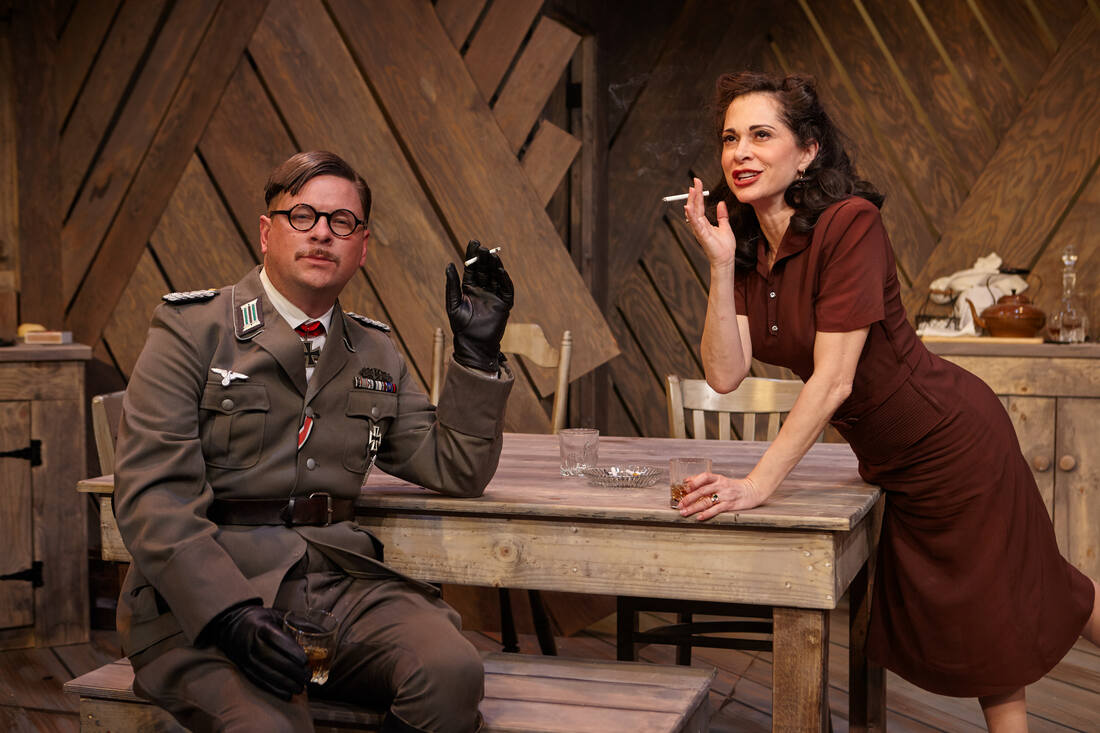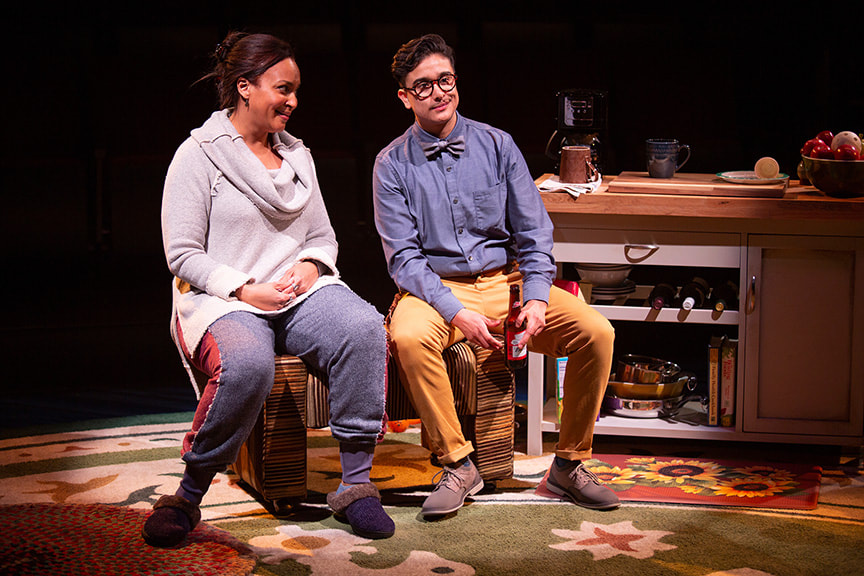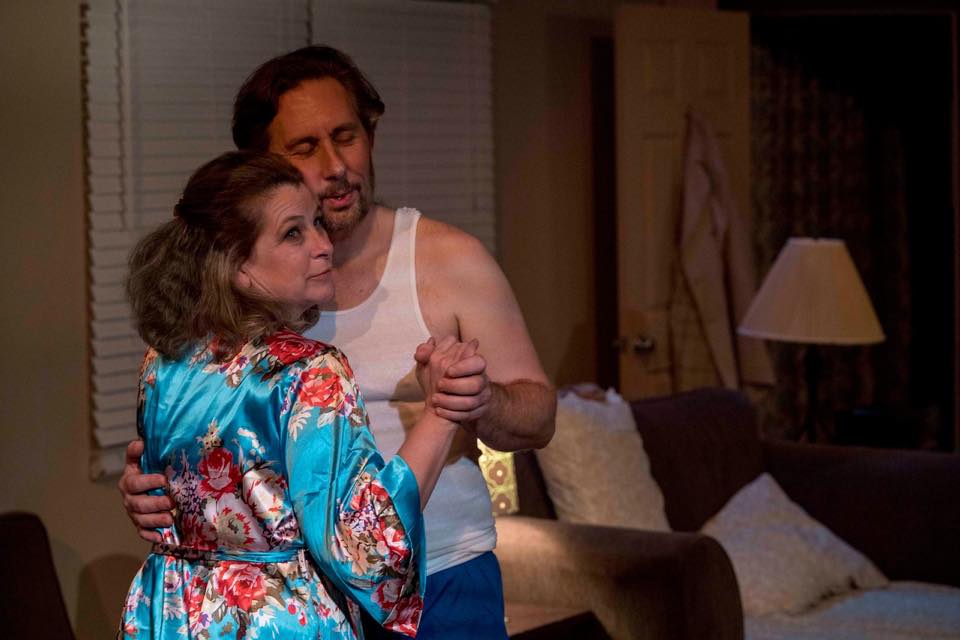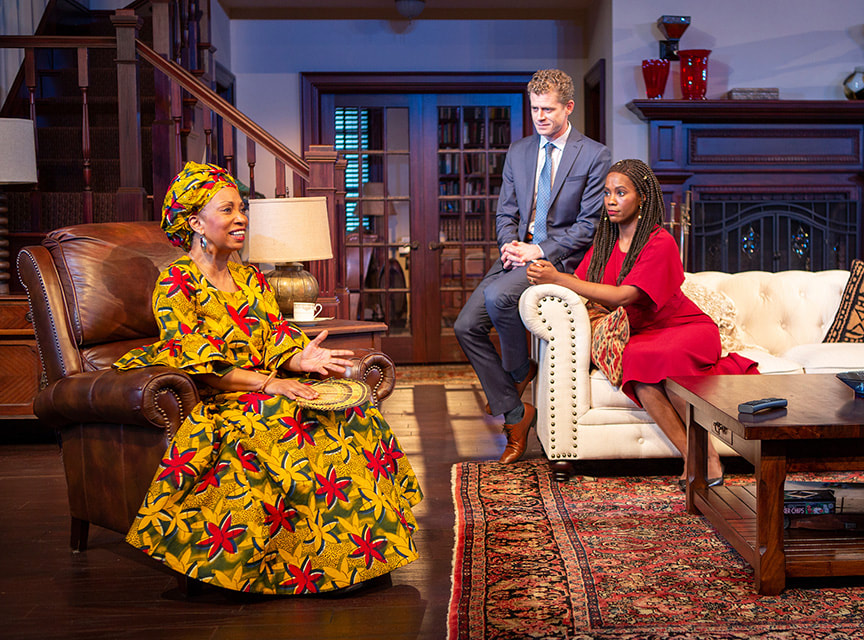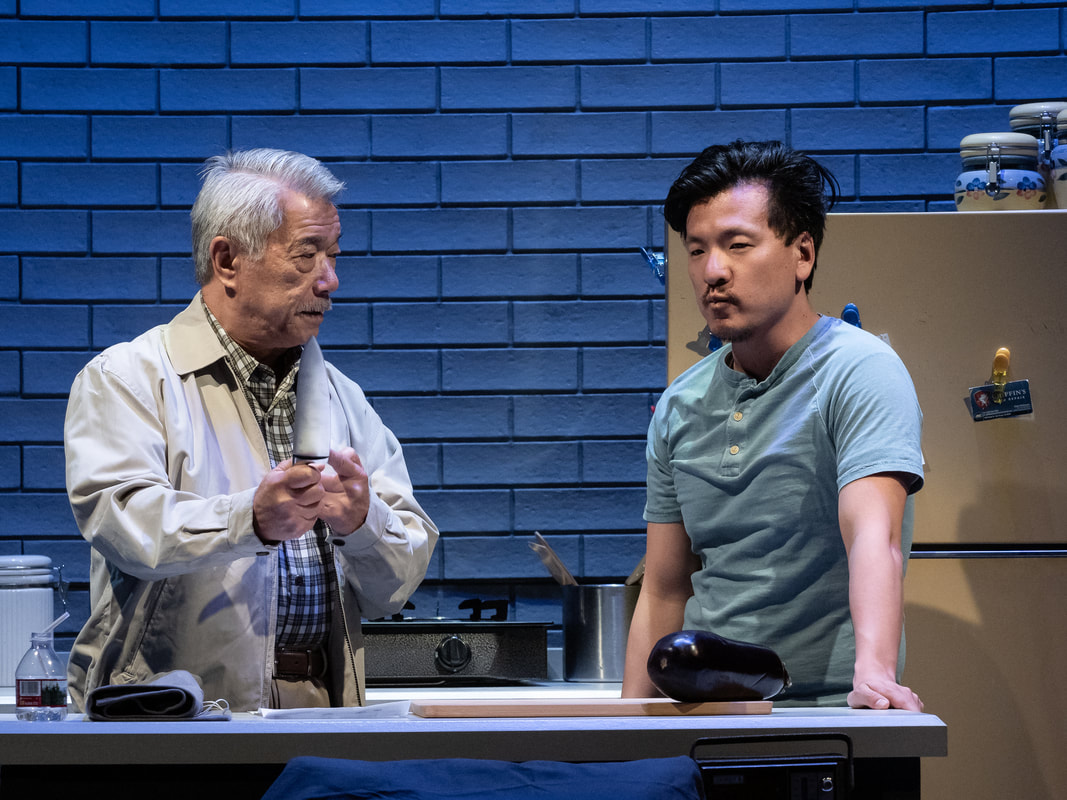|
Richard Baird and Jessica John in "Gabriel" at North Coast Repertory Theatre. Photo by Aaron Rumley Germany’s only occupation of the British Isles during World War II was of the Channel Islands, which included Guernsey off the coast of Normandy. That’s the setting for Moira Buffini’s Gabriel, a tense drama shrouded in mystery and dark secrets.
It’s 1943 and Jeanne Becquet (Jessica John), her young daughter Estelle (Catalina Zelles), her daughter-in-law Lily (Lilli Passero) and a housekeeper (Annabella Price) have been turned out of their home by the occupying Germans and forced to live in digs where half the time the power is out. Contemptuous of the occupiers but deft and pragmatic, Jeanne works the black market and keeps a predatory and pompous major named Von Pfunz (Richard Baird) on a string. Then into their lives comes a stranger, a body washed up on the shore, barely alive. Lily and Estelle nurse the handsome young man, who has no memory, back to health. The child calls him “Gabriel,” and the name sticks. But who he really is – a missing German SS man, a wayward Englishman with a terminal disease, a manifestation of Jeanne’s missing son, or an otherworldly angel befitting his “name” – is an open question and the catalyst for the play’s intrigue, intensity and raw emotion. Christopher Williams directs North Coast Repertory Theatre’s West Coast premiere of Gabriel, which debuted way back in 1997. This is an anxious, suspenseful production, if at times glacially paced. Each major character requires considerable time to reveal himself or herself, and in the case of the mysterious Gabriel (Alan Littlehales) the question of whether there ever will be answers looms throughout. There’s no question about the depth of the principal performances. Both John and Baird are first-rate, bringing to the fore the ambiguity and inscrutability of the complicated relationship between Jeanne and Von Pfunz. Meanwhile Passero, a newcomer to the North Coast Rep stage and a former finalist on NBC’s “The Voice,” balances strength and vulnerability as Lily, drawn as if in a magical dream to Gabriel while as a Jewish woman afraid for her very life in the presence of the Germans. Though over two and a half hours in length, Gabriel is riveting and, from a historical perspective, haunting as well. (Review originally published in San Diego CityBeat on 2/27/18.)
0 Comments
Opal Alladin (left) and Avi Toque in "Tiny Beautiful Things." Photo by Jim Cox Author Cheryl Strayed’s “Dear Sugar” advice column ran for almost two years in the online literary magazine The Rumpus, and it was no “Dear Abby.” Both its inquiries and its answers were lengthy, sometimes painfully frank and, in the case of Strayed’s advice, delivered with literary aplomb. A subsequent book compiled from the “Dear Sugar” columns later became a one-act play adapted for the stage by Nia Vardalos. Tiny Beautiful Things is getting its West Coast premiere in the Old Globe’s theater-in-the-round space.
Directed by James Vasquez, Opal Alladin bravely portrays Strayed, who responds to three supporting actors (Keith Powell, Dorcas Sowunmi and Avi Roque) portraying letter writers. The subject matter is frequently dark, even wrenching, with even one of “Sugar’s” own life stories just as horrifying. The play strives to soothe and succor, though as with real life, uneasiness pervades throughout. (Review originally published in San Diego CityBeat on 2/20/19.) Teri Brown and Charles Peters in "Frankie and Johnny at the Clair de Lune." Photo courtesy of OnStage Playhouse For anyone who’s ever stayed up all night in the company of someone very special there’s Terrence McNally’s Frankie and Johnny in the Clair de Lune. McNally’s genuine and intimate 1987 play tells the story of a first date between a short-order cook named Johnny and a waitress named Frankie that lasts until dawn, during which time the two characters figuratively and literally bare themselves to each other, and loneliness becomes new love.
At OnStage Playhouse the company’s artistic director, Teri Brown, is profoundly moving as Frankie, who wrapped up though she is in the hot sex isn’t sure about the deeper feelings coming from Johnny (Charles Peters, superb) or from inside herself. There isn’t a moment during Frankie and Johnny’s two engrossing hours that rings false, a testament to not only McNally’s words but to the performers and to the director of this production, Jennifer Peters (Charles’ wife). It’s easy to believe that the little Chula Vista stage is a New York studio apartment, that the unseen neighbors in the next building are in abusive or dead marriages, and that, in a nod to hope, Frankie and Johnny have found their soulmates. (Review originally published in San Diego CityBeat on 2/20/19.) The shadow of death darkens the already limited daylight of fictitious Bethlehem, Alaska, in Diversionary Theatre’s world-premiere presentation of Miranda Rose Hall’s The Hour of Great Mercy. Marrieds Maggie and Roger are grieving the loss of their daughter Rachel, accidentally killed in a hunting accident by her female lover, who later committed suicide. Maggie (Dana Case) tries to cope by teaching gun-safety classes and clutching a self-help book as if it were a Bible. Roger (Tom Stephenson), who believes his daughter was murdered by her lover, has channeled his grief into bitterness, rage and hatred, broadcasting it to the Bethlehem few from the shed he’s converted into a one-man volunteer radio station.
When Roger’s brother Ed (Andrew Oswald), a Jesuit priest who’s on Roger’s hate list for having memorialized both Rachel and her lover, turns up in Bethlehem, he has numbing news: He’s been diagnosed with Lou Gehrig’s Disease and plans to shoot himself to death “by the river.” The river, of course, will loom metaphorically throughout The Hour of Great Mercy, in words and song. Complicating the circumstances but providing uplift is Ed’s encountering a young nurse named Joseph (Patrick Mayuyu) in the church where they’ve both gone to pray. They quickly fall in love, and when Roger scorns Ed’s gentle plea to reconcile their family ties, Joseph becomes both Ed’s lover and caretaker. For almost total comic relief there is unfiltered, plain-spoken Irma (Eileen Rivera), who’s connected to almost everyone in some way and who milks all the humor in the play’s portrayal of Catholic ritual. Though Hall’s storytelling is packed with intimations about forgiveness, the fragility of life, and, blatantly, the complications of spiritual faith, The Hour of Great Mercy is a showcase for a couple of exceptional performances. Oswald’s, especially in the second act when Ed is in the throes of his insidious disease, is subtly powerful. Inhabiting the devastated Roger, Stephenson’s tortured silences are as startling as his eruptions. Rosina Reynolds directs a production that is best when immersed in its contemplative moments and not trying to be ironical or, as with Irma, so in search of easy laughs. (Review originally published in San Diego CityBeat on 2/13/19.) Wandachristine (left), Lucas Hall and Zakiya Young in "Familiar." Photo by J.T. McMillan Whether on the screen or on the stage, tales about planning for a wedding, with all the requisite chaos and familial infighting, can be trite. Familiar is not trite. That’s because actor-playwright Danai Gurira’s wedding story onstage at the Old Globe Theatre is both sensitive and substantive. Heritage and tradition are at odds with assimilation and midwestern comforts in the home (a cozy design by Walt Spangler) of Donald and Marvelous Chinyaramwira (Danny Johnson and Cherene Snow), whose daughter Tendi (Zakiya Young) is about to be married. Encouraged by her fiercely traditional Auntie Anne (Wandachristine), Tendi has opted for a pre-wedding Zimbabwe ritual. The consternation that ensues, mainly from Marvelous, results in a lot of shouting and many genuinely funny lines.
Familiar even boasts its moments of physical comedy, most physical of all at the very end of Act I. The play, directed by Edward Torres, does turn solemn in the second act, when a big reveal completely alters the tone, yet allows Johnson and Snow to deliver the show’s two most impassioned orations. (Review originally published in San Diego CityBeat on 2/6/19.) Dana Lee (left) and Brian Kim in "Aubergine." Photo by Jim Carmody Musings on the association between food, memories and emotions are nothing new. Nor are ruminations on death. In this sense, Julia Cho’s Aubergine explores no uncharted territory. But in spite of its familiarities, her dignified play about a dying father and the disconnected son attending him (with the help of a philosopher-king hospice nurse) is a graceful, ruminative piece. Toward its conclusion, Aubergine (the word means eggplant) postulates that, among other things, “death is food.” The two, one tangible the other anything but, are woven into the story of Ray (Brian Kim) and his father (Dana Lee) at the San Diego Repertory Theatre.
Director Todd Salovey oversees a production that while heavy on platitudes (most of them coming from the hospice nurse, Lucien (Terrell Donnell Sledge), relies on the lyricism of Cho’s writing and earnest performances from its ensemble, which also includes Audrey Park, Yong Kin and Amanda Sitton. While the audience-facing monologues interspersing Ray’s story feel manufactured, their messages are heartfelt. (Review originally published in San Diego CityBeat on 2/6/19.) With a flimsy storyline amounting to little more than an evocation of the old Mickey Rooney-Judy Garland “Let’s put on a show!” films of the ‘30s wrapped around a love story, “Crazy for You” is best appreciated as an episodic stage musical, one in which the parts are definitely greater than the whole. But the combination of some of Broadway’s most enduring songs (written by George and Ira Gershwin), dollops of slapstick (conceived by Ken “Lend Me A Tenor” Ludwig) and some hellacious tap dancing makes “Crazy for You” an audience-pleasing affair.
It certainly is at the Horton Grand Theatre downtown, where San Diego Musical Theatre is opening its 12th season with a rollicking production of “Crazy for You,” directed by Kirsten Chandler with inspired choreography by Jill Gorrie. “Crazy for You” debuted on Broadway in 1992. Based on the 1930 musical “Girl Crazy” (which introduced Ethel Merman to the stage), it features tunes from that show including “I Got Rhythm,” “But Not For Me” and “Embraceable You,” while incorporating songs from other musicals, among them “Shall We Dance” and “A Damsel in Distress.” The sophistication of many of these numbers can feel at odds with “Crazy for You’s” cowpoke motif, but with its big-as-all-outdoors spirit, everything falls together: romance, showgirls, shootin’ (well, with blanks), It all happens in lazy Deadrock, Nev. (described by town hotelier Lank Hawkins as “a town full of singing cadavers”) where big city banker Bobby Child (Jeffrey Scott Parsons) is sent by his overbearing mother (Katie Gucik) to foreclose on the burg’s dormant theater. Almost immediately the reluctant Bobby meets the only gal in town, pretty Polly Baker (Tayler Mettra). Can Bobby win Polly’s heart and save Deadrock’s old theater at the same time? The musical journey to the wow finish is a Gershwins celebration, from the swooning “Embraceable You,” “Shall We Dance”) to the rousing (“Slap That Bass,” the show-stopping “I Got Rhythm”). Superbly juggling singing, dancing and comedy in this show, Parsons croons “They Can’t Take That Away from Me” with easy grace. The sparkling Mettra solos with earnest sweetness on “But Not For Me” and “Someone to Watch Over Me,” one of the Gershwins’ most plaintive compositions. (Frank Sinatra’s understated rendition in the 1955 film “Young at Heart” will always be the definitive version.) David McBean contributes a wacky turn as producer Bela Zangler (who Bobby impersonates and with whom he shares the show’s funniest scene). There are also winning supporting performances from Edward Chamberlain (as Lank) and Kelly Derouin (as the “fiancée” Bobby forsakes). But most of all, SDMT’s “Crazy for You” is a two-plus-hour party of dancing both sumptuous and acrobatic. Everyone gets into the act, whether it’s the showgirls leg-kicking, the Deadrock locals swinging pickaxes in percussive rhythm, or Bobby and Polly moving as elegantly as if in a ballroom. It might be crazy to suggest that a Gershwin song could ever be upstaged by choreography, but like Bobby and Polly, the two are made for each other in this wholly likable show. (Review originally published in the San Diego Union-Tribune on 2/4/19.) |
AuthorDavid L. Coddon is a Southern California theater critic. Archives
July 2024
Categories |
David Coddon |
|
